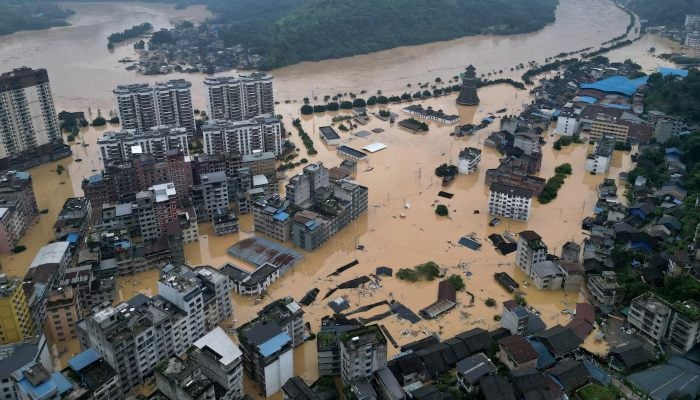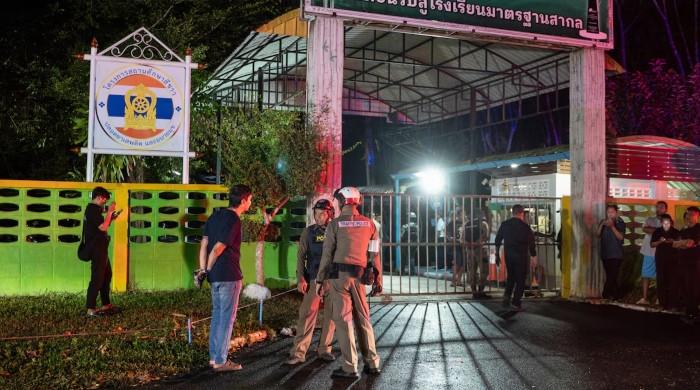Storms dump nearly a year of rain in northern China, 19,000 evacuated
As much as 447.4mm of rain fell in Yi, in the western part of Baoding, in 24 hours
July 25, 2025

BEIJING: Storms in northern China have poured nearly a year's rainfall on Baoding, an industrial city on the doorstep of the capital Beijing, forcing over 19,000 people out of their homes as streets began to go under water and roads were being cut off.
As much as 447.4 mm (17.6 inches) of rain fell in Yi, in the western part of Baoding, in the 24 hours to early Friday morning, and records were reset at a number of weather stations in Hebei province, which Baoding is part of.
Official records show annual rainfall in Baoding averages above 500 mm.
A total of 19,453 people from 6,171 households were evacuated, the China Meteorological Administration (CMA) said in a social media post.
The forecaster did not mention where the residents were moved to, but shared a short clip showing two policemen in neon rain jackets boot-deep on a waterlogged street as rains poured down at night.
The forecaster compared the amount of precipitation to the exceptional rainfall brought by a powerful typhoon in 2023, which inundated the capital Beijing with rains unseen since records began 140 years ago.
Baoding's Zhuozhou, which suffered devastating floods in those rains two years ago, saw access to several bridges and roads cut off after the storms unleashed more than 190 mm of rain by Friday morning.
Northern China has witnessed record-breaking rainfall in recent years, exposing densely populated cities including Beijing to flood risks. Some scientists link the higher rainfall in China's usually arid north to global warming.
Hebei province recorded 640.3 mm in annual rainfall last year, 26.6% more than its decades-long average, according to CMA's 2024 climate bulletin on the province.
The report said Hebei has been recording consecutive above-average annual precipitation since 2020.
Last summer, Baoding, together with neighbouring cities Zhangjiakou, Langfang, Xiongan and Cangzhou had 40% more than the usual seasonal precipitation, with some localised areas within Baoding recording 80% more rains, the report showed.
The intensifying rainfall forms part of the broader pattern of extreme weather across China due to the East Asian monsoon, which has caused disruptions in the world's second-largest economy.
Chinese authorities are watchful of extreme rainfall and severe flooding as they challenge China's ageing flood defences, threaten to displace millions and wreak havoc on a $2.8 trillion agricultural sector.
Baoding maintained a red alert for heavy rains on Friday morning, while Hebei upgraded its emergency response preparedness.
About 160 km (100 miles) from Baoding, Beijing was not spared the impact.
Rains were forecast to intensify, potentially accumulating to more than 50 mm over a six-hour period from Friday afternoon till Saturday morning in a number of districts, state broadcaster CCTV said.
The capital is expected to see the heaviest rainfall since its flooding season began, potentially triggering flash floods, debris rushing down mountains, landslides and other secondary disasters, CCTV reported.
Elsewhere in the country's north, heavy rains disrupted railway service in Inner Mongolia as authorities suspended several passenger trains passing through high-risk areas from Friday to Tuesday.











